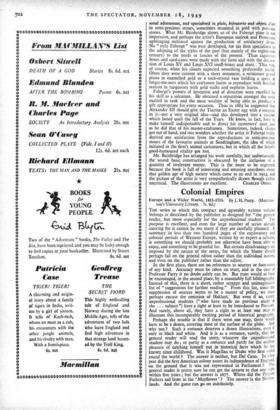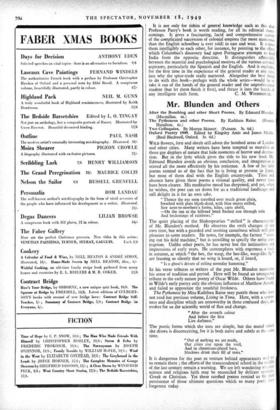Colonial Empires
0
0 0 0 0 0
0
0 0 0
O
0
0
O 0 0 0 0 0
0
0 0 0
O
0 0
O O 0 O
0 0 0 0 0
0
0 0 0 0 0 0 0 0 0
O
0 0 0 0 0 0 0
Europe and a Wider World, 1415-1715. By J. H. Parry. (Hutchin- son's University Library. 7s. 6d.) THE series to which this compact and agreeably written volume belongs is described by the publisher as designed for " the general reader, but more especially for the unprofessional student." The purpose is excellent, and even the large number of series already catering for it cannot be too many if they are carefully planned. A summary in less than two hundred pages of the exploratory and colonial periods of Western Europe, written by so expert a scholar, is something we should probably not otherwise have been able to enjoy, and something to be grateful for. But certain disadvantages are imposed by the nature of the series, for which the blame should perhaps fall on the general editor rather than the individual author, and even on the publisher rather than the editor. In the first place, there are no references to sources or foot-notes of any kind. Accuracy must be taken on trust, and in the case of Professor Parry it no doubt safely can be. But trust would at least be encouraged, in the second place, by a reasonably full bibliography. Instead of this, there is a short, rather scrappy and unimaginative list of " suggestions for further reading." From this list, since the suppression of sources seems to be a matter of policy, we must 0 perhaps excuse the omission of Hakluyt. But even if so, surely unprofessional students (" who have made no previous study of the . . . subject ") have a right at least to be introduced to Prescott. And surely, above all, they have a right to at least one map to illustrate this incomparably exciting period of historical geography. Perhaps the trouble is that if there were one map, there wouli have to be a dozen, covering most of the surface of the globe. And why not ? Such a romance deserves a dozen illustrations, even if only in black and white. And it is as a romance, surely, that the general reader will read the story, whatever the unprofessional student may do ; or partly as a romance and partly for the endless pleasure of catching himself out in historical facts which he h53 known since childhood. Was it Magellan or Drake who first s tiled round the world ? The answer is neither, but Del Can°. In whit year did the first American colony assert its independence of England, on the ground that it was not represented in Parliament ? The general reader is pretty sure he can get the answer to that one light within five years ; but the answer is 1677. Where did the Pilgrim Fathers sail from in the Mayflower' ? The answer is the Netter' lands. And the game can go on indefinitely. It is not only for titbits of general knowledge such as thi. that Professor Parry's book is worth reading, for all its editorial short- comings. It gives a fascinating, lucid and comprehensive survey of the complicated succession of colonial empires (far more numerous than the English schoolboy is ever told) in east and west. It rcierci them intelligibly to each other, for instance, by pointing to the cffe.:t which Columbus's discovery had upon Portuguese attempts to find India from the opposite direction. It distinguishes admirably between the material and psychological motives of the various colonial aspirants, particularly the Spanish and the English. And it explain;, for the first time in the experience of the general reader at any rate, just why the spice-trade really mattered. Altogether the best thing to do with this book—perhaps with the whole series—would be to take it out of the hands of the general reader and the unprofessional student (but let them finish it first), and thrust it into the hand; of
any intelligent sixth form. C. M. WOODHOUSE.















































































 Previous page
Previous page